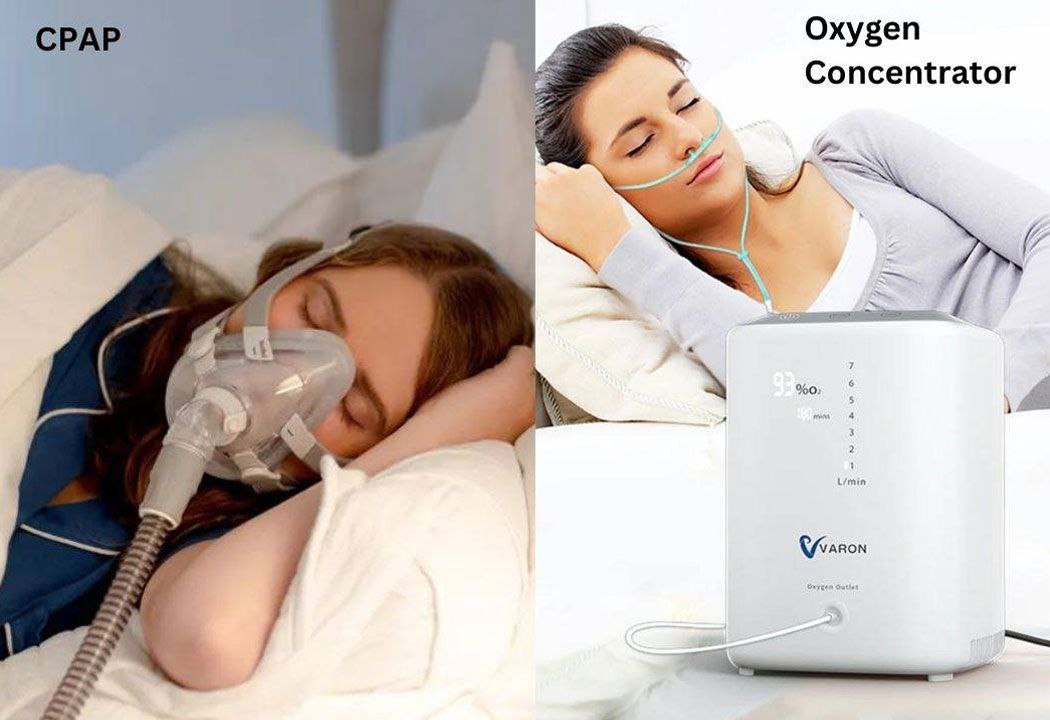
CPAP vs. Home Oxygen Concentrator: Understanding the Difference
Living with sleep apnea can disrupt your nights and leave you feeling exhausted during the day. If you've been diagnosed with sleep apnea, your doctor might recommend a CPAP (Continuous Positive Airway Pressure) machine as part of your treatment plan. But what exactly is the difference of CPAP machine with home oxygen concentrator, and how can it help you achieve a better night's sleep?
What is Sleep Apnea and How Does it Affect You?
Sleep apnea is a sleep disorder characterized by repeated pauses in breathing throughout the night. These pauses can last for several seconds or even minutes, often occurring hundreds of times in a single night. There are two main types of sleep apnea:
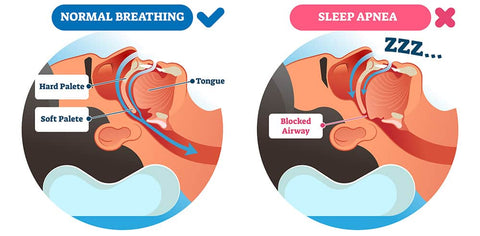
- Obstructive sleep apnea (OSA): This is the most common form, where the upper airway becomes blocked during sleep due to relaxed throat muscles or excess tissue.
- Central sleep apnea: This type occurs when the brain fails to send signals to the muscles that control breathing.
Regardless of the type, sleep apnea disrupts your sleep cycle, preventing you from reaching the deep, restorative stages of sleep. This can lead to a variety of symptoms, including:
- Daytime sleepiness and fatigue
- Difficulty concentrating
- Morning headaches
- Irritability
- Mood swings
- Loud snoring
- Waking up gasping for air
The Benefits of CPAP Therapy
CPAP therapy is considered the gold standard treatment for sleep apnea. Here's how consistent use of a CPAP machine can significantly improve your health and well-being:
- Improved Sleep Quality: By keeping your airways open, CPAP therapy prevents breathing interruptions, allowing for deeper and more restful sleep.
- Reduced Daytime Sleepiness: With a better night's sleep, you'll experience increased energy levels and improved alertness throughout the day.
- Enhanced Cognitive Function: Sleep apnea can affect memory and concentration. CPAP therapy can help improve cognitive function and overall mental clarity.
- Lowered Risk of Health Problems: Sleep apnea is linked to various health conditions like high blood pressure, heart disease, stroke, and diabetes. CPAP therapy can help reduce the risk of these complications.
- Reduced Snoring: Many people with sleep apnea also snore heavily. CPAP therapy effectively eliminates or significantly reduces snoring, leading to a quieter and more peaceful sleep environment for you and your partner.
Understanding the Difference: CPAP vs. Home Oxygen Concentrator
While both CPAP machines and home oxygen concentrators play a vital role in respiratory health, they serve distinct purposes. Here's a breakdown to help you understand the difference:
CPAP Machines:
- Function: CPAP machines treat sleep apnea by delivering continuous positive airway pressure. This pressurized air keeps your airways open during sleep, preventing breathing interruptions and promoting deeper sleep.
- Who Needs Them: Individuals diagnosed with obstructive sleep apnea (OSA) typically benefit from CPAP therapy.
- Oxygen Levels: CPAP machines don't directly increase the oxygen concentration in the inhaled air. They filter and pressurize the room air, ensuring a constant flow to keep your airways open.
Home Oxygen Concentrators:
- Function: Home oxygen concentrators are health care devices designed to deliver supplemental oxygen to patients with chronic respiratory conditions like COPD (Chronic Obstructive Pulmonary Disease) or heart failure. These conditions can lead to low blood oxygen levels, making it difficult to breathe.
- Who Needs Them: Individuals with chronic respiratory illnesses that cause low blood oxygen saturation may require supplemental oxygen therapy at home.
- Oxygen Levels: Home oxygen concentrators draw in room air, separate the oxygen molecules from other gases, and deliver a concentrated stream of oxygen (usually 90-95% pure) through a nasal cannula or mask.
Key Differences:
- Pressure: CPAP machines deliver pressurized air, while home oxygen concentrators deliver concentrated oxygen.
- Applications: CPAP therapy treats sleep apnea, while home oxygen therapy treats chronic respiratory conditions.
- Oxygen Levels: CPAP machines don't significantly alter the oxygen content in the air you breathe. Home oxygen concentrators increase the oxygen concentration for individuals who require supplemental oxygen.
CPAP Therapy and Supplemental Oxygen: Can They Be Used Together?
In some cases, individuals with sleep apnea may also require home oxygen therapy due to underlying respiratory conditions. Here's where CPAP and home oxygen concentrators can work together:
- Combination Therapy: Some CPAP machines can be adapted to work with a home oxygen concentrator. This allows for the delivery of both continuous positive airway pressure and supplemental oxygen through the same mask.
- Benefits: Combination therapy can be particularly beneficial for individuals with sleep apnea and chronic respiratory conditions like COPD who experience low blood oxygen levels during sleep.
How Combination Therapy Works
Combination therapy involves using a CPAP machine alongside a home oxygen concentrator. Here's a breakdown of the process:
- The CPAP Machine: As usual, the CPAP machine generates a steady stream of pressurized air.
- The Oxygen Concentrator: The home oxygen concentrator draws in room air, separates the oxygen molecules, and delivers a concentrated stream of oxygen (usually 90-95% pure).
- Connection and Delivery: The oxygen concentrator can be connected to the CPAP machine using a special adapter or bleed-in port on the CPAP itself. This allows the blended air – pressurized air from the CPAP machine mixed with concentrated oxygen from the concentrator – to travel through the tubing and deliver it directly to your mask.
-
Benefits of Blended Air: This blended air provides the following advantages:
- Addresses Sleep Apnea: The pressurized air keeps your airway open, preventing sleep apnea episodes.
- Corrects Oxygen Desaturation: The supplemental oxygen ensures your blood receives the necessary oxygen level for optimal functioning throughout the night.
- Improved Sleep Quality: By addressing both sleep apnea and low oxygen levels, combination therapy can significantly improve your sleep quality, leading to deeper and more restorative sleep cycles.
Who Can Benefit from Combination Therapy?
For individuals with sleep apnea and low blood oxygen levels (hypoxemia), this teamwork offers significant advantages:
- Deeper, More Restful Sleep: The combination ensures open airways (thanks to CPAP) and adequate oxygen levels (thanks to the concentrator), promoting deeper and more uninterrupted sleep.
- Reduced Sleep Disruptions: Sleep apnea episodes often cause brief awakenings. Combination therapy can significantly reduce these disruptions, leading to a more continuous sleep cycle.
- Enhanced Daytime Energy: Improved sleep quality translates to increased daytime energy levels and improved cognitive function.
- Reduced Risk of Complications: Chronic low oxygen levels can contribute to various health problems. By maintaining adequate oxygen during sleep, combination therapy can help manage this risk
Important Considerations for Combination Therapy
If you suspect you might need both CPAP and oxygen therapy, consider these points:
- Individualized Approach: While combination therapy can be highly beneficial, it's not a one-size-fits-all solution. Finding the right settings requires careful consideration of your specific needs.
- Optimizing Oxygen Flow: The appropriate oxygen flow rate is crucial for optimal therapy. This setting should be determined based on individual needs.
- CPAP Machine Adjustments: For combination therapy, ensuring your CPAP machine is properly adjusted is essential. Consulting a sleep specialist can be helpful in this regard.
Looking Ahead: VARON and Your Respiratory Health
At VARON, we understand that respiratory needs can be complex. While our current focus is on oxygen concentrators, we are committed to providing innovative solutions for a wider range of respiratory challenges. Stay tuned for exciting announcements about our expanding product range in the future. In the meantime, we are here to support you on your journey to better breathing and a healthier you!
Conclusion: Breathe Easy and Embrace a Healthier You with CPAP Therapy
If you're struggling with sleep apnea and its daytime consequences, CPAP therapy can be a life-changing solution. Consistent use of a CPAP machine can lead to deeper sleep, improved energy levels, enhanced cognitive function, and a reduced risk of various health complications. While adjusting to CPAP therapy may require some initial effort, the long-term benefits are undeniable.
Ready to take control of your sleep and experience a healthier, more fulfilling life?
VARON is here to support you on your journey to better sleep. We offer a variety of resources to help you get started with CPAP therapy, including:
- Informative blog posts: Our blog is a treasure trove of information on sleep apnea, CPAP therapy, and related topics.
- A knowledgeable team: Our friendly and knowledgeable staff is happy to answer your questions and guide you through the process of choosing the right oxygen machine and supplies.
Contact VARON today! Let us help you find the oxygen solution that fits your needs and empowers you to breathe easier and sleep sounder.
Don't wait any longer. Invest in your sleep, invest in your health.










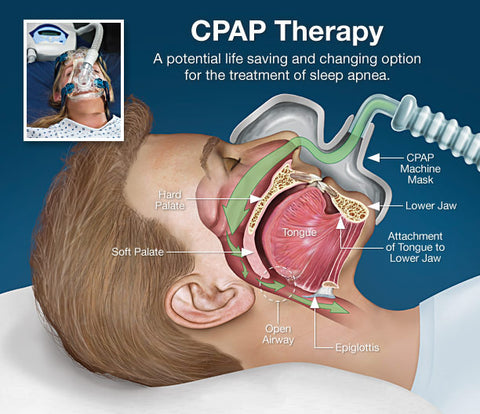

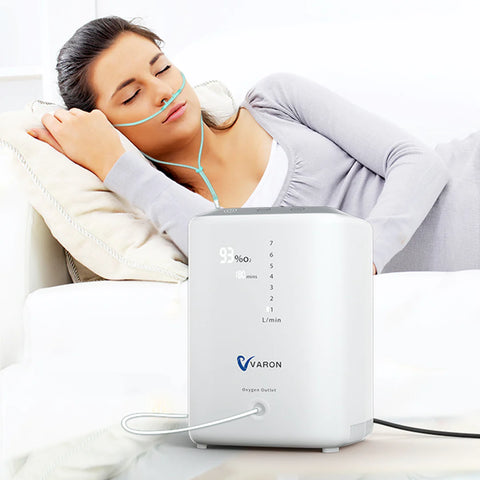

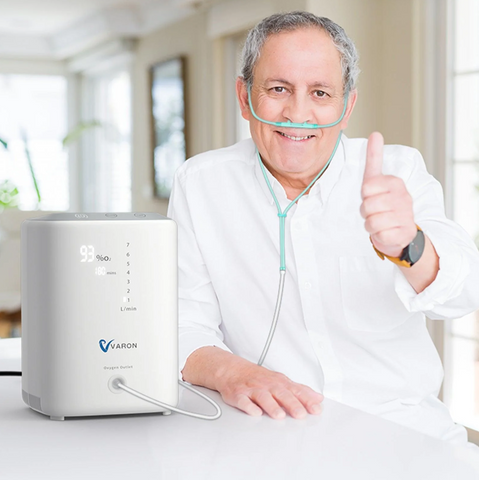






Dejar un comentario